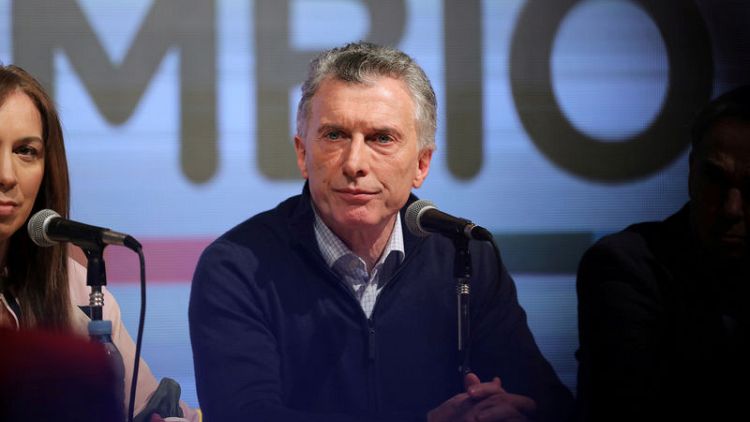By Nicolás Misculin
BUENOS AIRES (Reuters) - Argentina's pollsters, still smarting after failing to predict a landslide defeat for President Mauricio Macri in an August primary, are sheepishly re-emerging with an updated election forecast: a huge win for opposition leader Alberto Fernandez.
Fernandez, a moderate Peronist who until this year was little known outside Argentina, won by a far larger-than-expected 16 points in August, dashing Macri's hopes of being re-elected at the end of the year.
The shock result rattled Argentina's debt and currency markets, driving the peso and bonds to record lows as investors worried about the country's shift back to populist-style policies.
Fernandez is running on a ticket with populist ex-leader Cristina Fernandez de Kirchner, a militant populist who commands an ardent support base but who also alienated investors and business during her presidency from 2007 to 2015.
Pollsters, who had almost universally predicted a close race, are now catching up, forecasting that Fernandez will beat Macri by an even bigger margin in the Oct. 27 general vote. A victory by over 10 points means a run-off second round would not be needed.
Fernandez is expected to win the election in the first round with 51.5% of the vote versus 34.9% for Macri, according to Ricardo Rouvier & Asociados. Consultancy Trespuntozero gave Fernandez 51.9% against 34% for market-friendly conservative Macri. Pollster Clivajes estimated a similar 52.6%-32.5% split.
"What I see is a consolidation of the outcome" of the primaries, analyst Julio Burdman, whose consultancy Electoral Observatory is still completing its polls, said in an interview.
In the primaries, a major poll of the likely election outcome, Fernandez won 47.78% of the votes compared to 31.79% of Macri, leading many to write off Macri's chances later in the year. With blank votes counted - as is the case in the general election - Fernandez would have exceeded 49%.
In Argentina, to win the election in the first round and avoid a run-off, the top candidate must exceed 45% of the vote or more than 40% with a 10-point lead over second place.
Argentina's recession-hit economy was hit hard after the primaries as investors dashed for the exits, worried about a vacuum of power and Fernandez reinstating controls over the economy if he were to take over at the end of the year.
Since then, Macri has been forced to announce plans to delay debt repayments and imposed capital controls to protect the peso and stop a drain of the country's foreign exchange reserves.
The country's polling firms, some of which had given Macri a decent chance of winning reelection, received sharp criticism for failing to predict the result by such a wide margin.
Experts pointed out that a lack of more costly face-to-face surveys and reliance on fixed-line phones meant polls often failed to reach the poorest neighbourhoods or younger voters. The lower class and youth are two key backers for Fernandez.
"It is a science that is not accurate," one pollster told Reuters on condition of anonymity, adding that the environment had seemed to be improving for the government before the primary vote.
"But now it is much harder for pollsters to make mistakes. The PASO (primary) gave us a more accurate picture to correct the data."
(Reporting by Nicolas Misculin; Editing by Adam Jourdan and Richard Chang)
